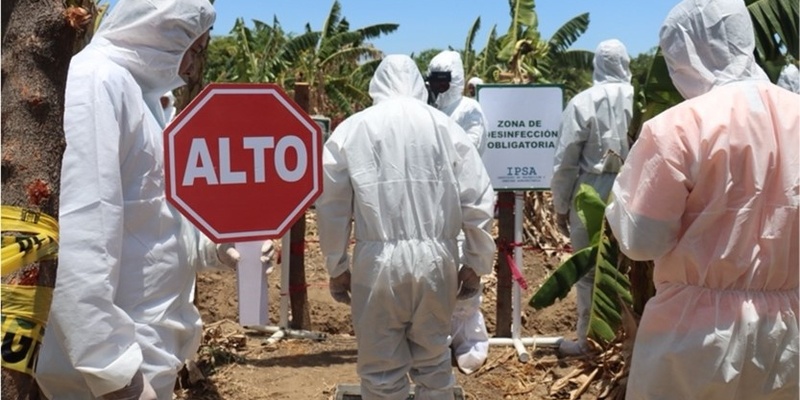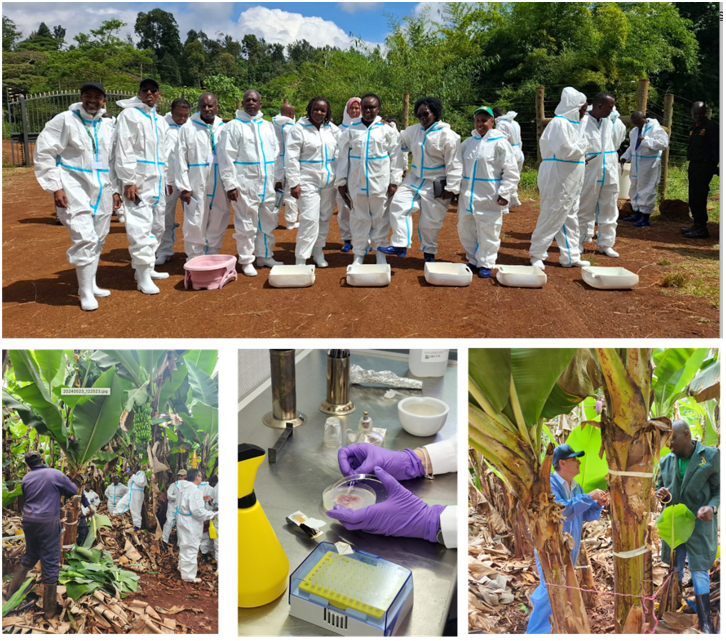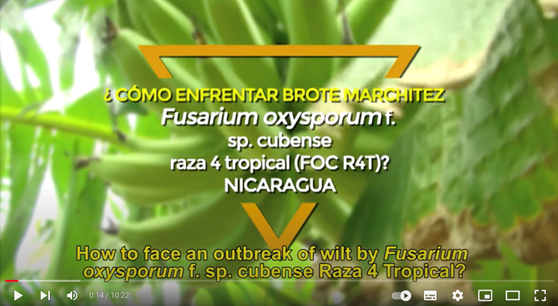Simulation exercises: A crucial tool in combatting emerging pests
Posted on Thu, 11 Jul 2024, 12:56

© IPSA/ Fernando Medina
In the ongoing battle against agricultural pests, simulation exercises have emerged as a critical component of global plant protection strategies. Simulation exercises are relevant for all emerging pests and have most recently been used by national plant protection organizations as a prevention and preparedness tool against Fusarium oxysporum f.sp. cubense Tropical Race 4 (TR4) of banana pest outbreaks. Bananas and plantains are grown in 135 countries globally, where more than 400 million people depend on bananas for food security, accounting for USD 10 billion in global trade every year. Fusarium TR4 is particularly insidious due to its persistence in the soil and its ability to spread through contaminated equipment, water, and plant material. At present there is no way of eliminating Fusarium TR4 once it’s in the soil, making prevention, preparedness and timely response critical in stopping its spread.
Simulation exercises are scenario-based drills that mimic real-world outbreaks, putting countries at the forefront of tackling potential pest infestations. Since 2023, when the Commission on Phytosanitary Measures (CPM-17 requested that the International Plant Protection Convention (IPPC) Secretariat take a leading role on global coordination efforts against Fusarium TR4, the secretariat has partnered with the Food and Agriculture Organization (FAO) field offices, regional plant protection organizations (RPPOs) and national plant protection organizations (NPPOs) to develop the current simulation exercise protocols and recommendations. By focusing on several key areas like early detection, rapid response, and containment and involving national phytosanitary stakeholders, during a simulation exercise participants stage a real-life pest outbreak and can therefore practice identifying symptoms, implementing quarantine measures, coordinating cross-border responses and developing an implementable contingency plan, should the threat ever arise.
Mesoamerica: simulation exercises, a core element of the region’s preparedness, prevention and response strategy
Raixa Llauger, Agriculture Officer (Tropical Fruits) of the Subregional Office FAO for Mesoamerica has championed capacity development and preparedness within the Latin America region since Fusarium TR4 was first identified in 2019, working hand-in-hand with the regional plant protection organization, Organismo Internacional Regional de Sanidad Agropecuaria (OIRSA). Since then simulation exercises on Fusarium TR4 have been carried out in Belize, Colombia, Costa Rica, Dominical Republic, Ecuador, El Salvador, Guatemala, Honduras, Mexico, Nicaragua, Panama and soon also in Bolivia. When asked why the region has invested in conducting numerous simulation exercises Raixa explains that this strategy has allowed countries to strengthen the preventive approach and biosecurity throughout the production, transportation and international trade chain of bananas. Preparation allows countries to review their phytosanitary systems, including capabilities, resources and components of a contingency plan, as well as the systems or subsystems that work well and highlight areas of improvement. This prepares countries to face a possible phytosanitary threat while also promoting and reinforcing emergency management processes, contingency and action plans, among others.
Find out more about IPSA and the NPPO’s regional simulation activities against Fusarium TR4 in Nicaragua
Raixa also cites a successful example of containment of the pest in Colombia where the country has been able to slow down the advance of the disease, which has allowed production and export, even in the presence of Fusarium TR4, not only to be maintained, but to increase from 2019 until the end of 2023. In the case of Ecuador, as presented during the CPM-18 side session, the world's leading banana exporter, the preparedness strategy has meant that a national contingency plan is in place leading to an updated phytosanitary legislation to account for the Fusarium TR4 threat, including eleven technical resolutions.
The Mesoamerica region is consistently looking for ways to improve simulation exercises and capacity development. Currently, OIRSA is carrying out tests at its San Salvador headquarters to develop a room where artificial simulation is being used with immersive techniques for the application of sanitary and phytosanitary measures – specifically surveillance, sampling, biosecurity, capacity evaluation and other actions on agricultural pests and diseases. This 3D simulator is the first worldwide to be developed for the management of emerging pests using artificial intelligence and is expected to become fully operational in the last quarter of 2024.
Africa: protecting the future of the banana crop within the region
As part of the COMESA Trade Facilitation Project, funded by the European Union, the first Fusarium TR4 simulation exercise for the COMESA region took place in Kenya in May 2024. This was part of a wider capacity development programme which included the development of IPPC guides and e-learning courses and in-person and virtual Fusarium TR4 diagnostic and surveillance training courses for representatives from the COMESA region. All of these activities were embedded in the IPPC’s Global Coordination mandate.
The simulation exercise was led by the IPPC Secretariat, in partnership with FAO Mesoamerica and, as the first simulation exercise to be conducted in Africa, it was an important milestone for the region. Representatives from COMESA countries, namely Comoros, Egypt, Ethiopia, Eritrea, Madagascar, Somalia, Burundi, Congo, Malawi, Sudan, Eswatini and Zimbabwe met in Nairobi for a simulation exercise that covered all stages from preparation, to response to a first outbreak or positive case, to containment of infected plants.
Over the course of the week, simulation scenarios were staged at possible entry points including on a farm and in a diagnostic laboratory. Through these real-life simulations, in a controlled operating environment, participants were able to test and improve preparedness to respond to a Fusarium TR4 outbreak through capacity building, improving understanding of techniques, tools, and resources, and improving coordination and application of risk reduction techniques. As part of the exercise, participants worked on developing elements of a continency plan to cover all key aspects of an emergency response system.

Participants taking part in simulation scenarios on a farm and in a diagnostic laboratory during the simulation exercise in Kenya © KEPHIS
Core to the success of this simulation exercise was the transference of skills between FAO Mesoamerica and the COMESA region. As emphasized by Yoseph Shiferaw Mamo, Officer-In-Charge, Industry and Agriculture Division – COMESA Secretariat during the opening ceremony in Kenya “I specifically thank our colleagues from FAO and the IPPC Secretariat. This simulation exercise, and all the preparatory work that has gone into planning it, has significantly benefited from the sum of capabilities and experience to train, update and define roadmaps and concrete actions in each of the countries that are participating in this first exercise”.
With the effects of climate change increasing the threat of emerging pests, strengthening phytosanitary preparedness and response capacities is ever more important. Following the success of the COMESA trade facilitation project, simulation exercises will continue to be a priority for the IPPC Secretariat, with the transfer of knowledge to other regions taking place within Pest and Outbreak Response System framework.
Related information:
IPPC Global coordination on Fusarium oxysporum f. sp. cubense Tropical Race 4 (TR4)


